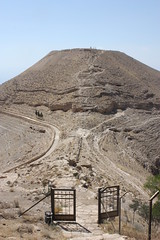
The Jewish historian Josephus writes about both genuine historical persons and events and mythical characters and events as if they are all equally historical. Adam and Vespasian, the siege of Jerusalem and the last stand at Masada, are all documented in a single work of ancient historiography.
Is there some method or rule that can be applied to help us decide when Josephus is telling us something that is “a true historical memory” and when he is passing on complete fiction?
Is genre the answer?
We cannot use genre as an absolute rule. Genre can offer us some sort of guide to the intentions of the author. But Josephus is no better than Herodotus or the historical books of the Jewish Bible when it comes to freely mixing mythical accounts and historical memory within the same ostensibly historiographical scrolls. Genre can deceive the unwary. The myth of Masada has long been accepted as “historical fact” largely because it forms a literary and ideologically aesthetic conclusion to the demonstrably historical report of the siege and fall of Jerusalem. Some information used by Josephus is known without any doubt to be historical because it is independently witnessed by both archaeological remains and external — “controlling” — literary witnesses. But archaeology has also given us reason to believe that the numbers of sieges and conquests of Jerusalem by the Babylonians in the sixth century was doubled for literary-theological reasons. Continue reading “Sifting fact from fiction in Josephus: John the Baptist as a case study”
